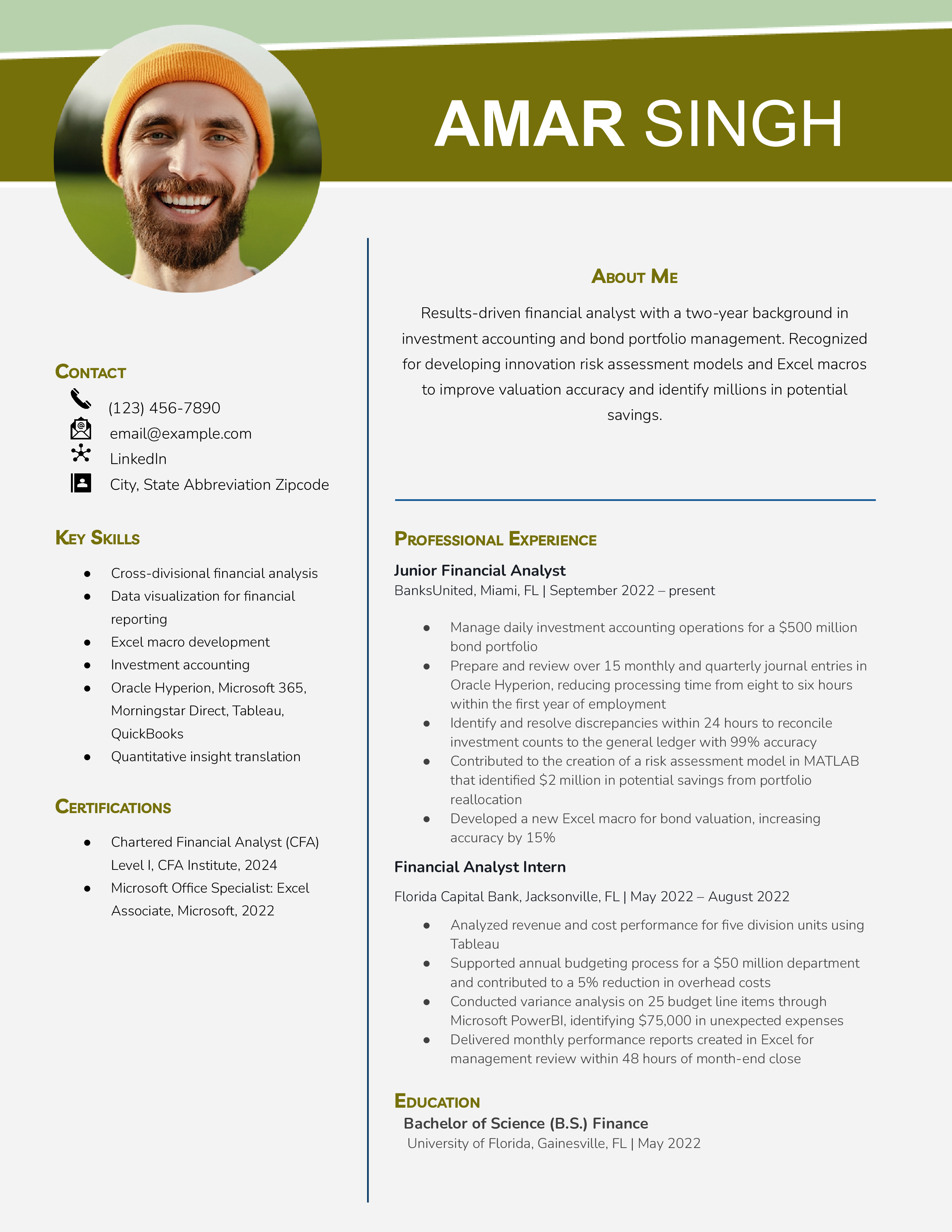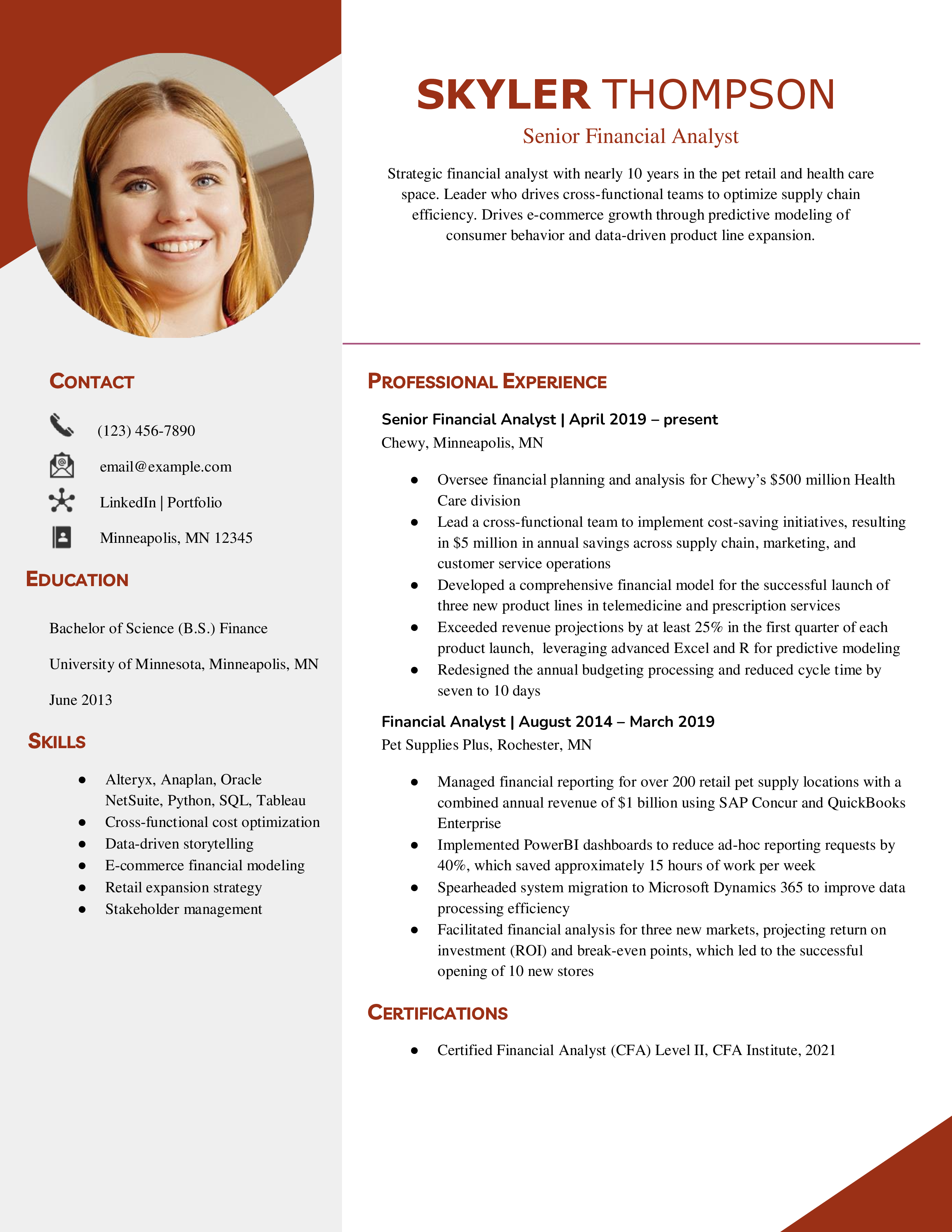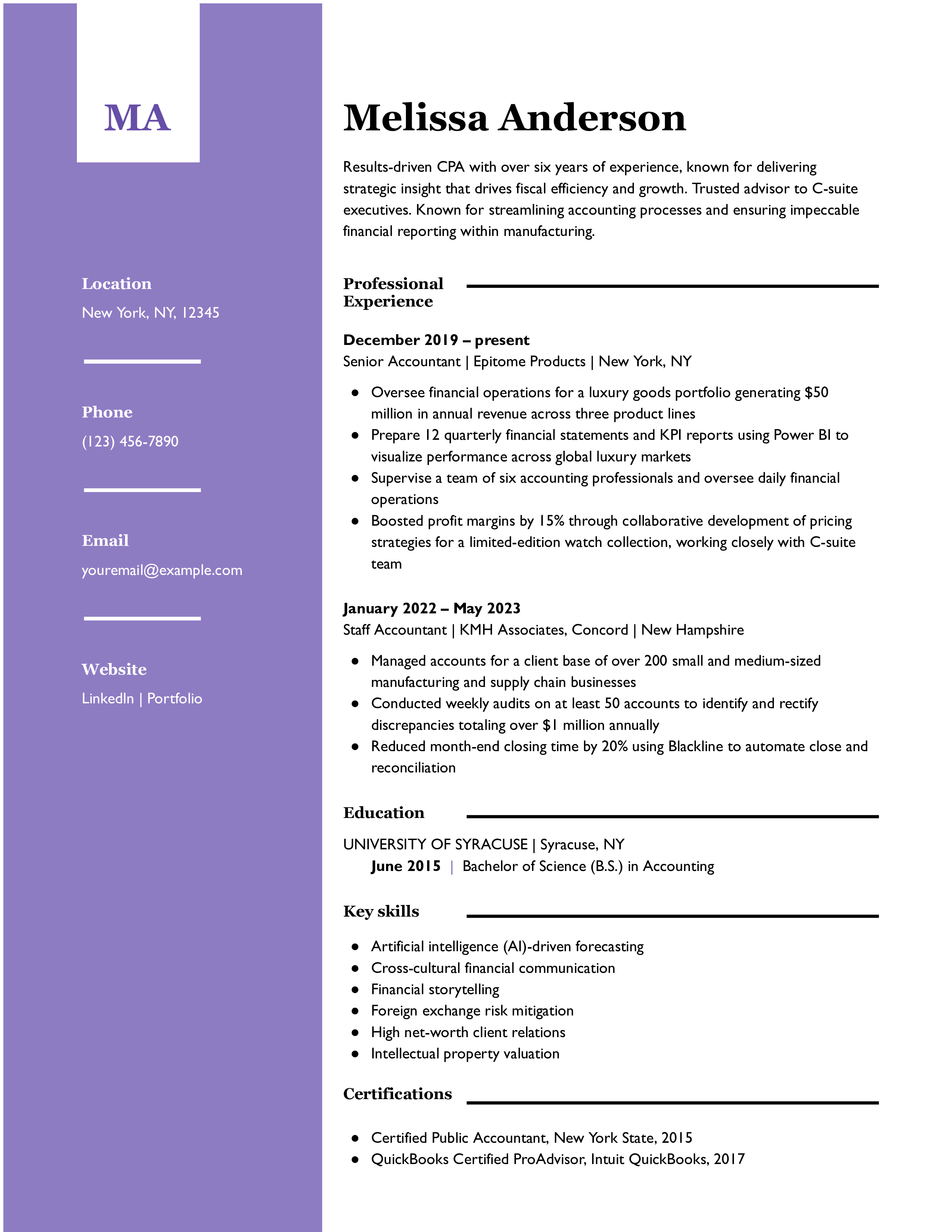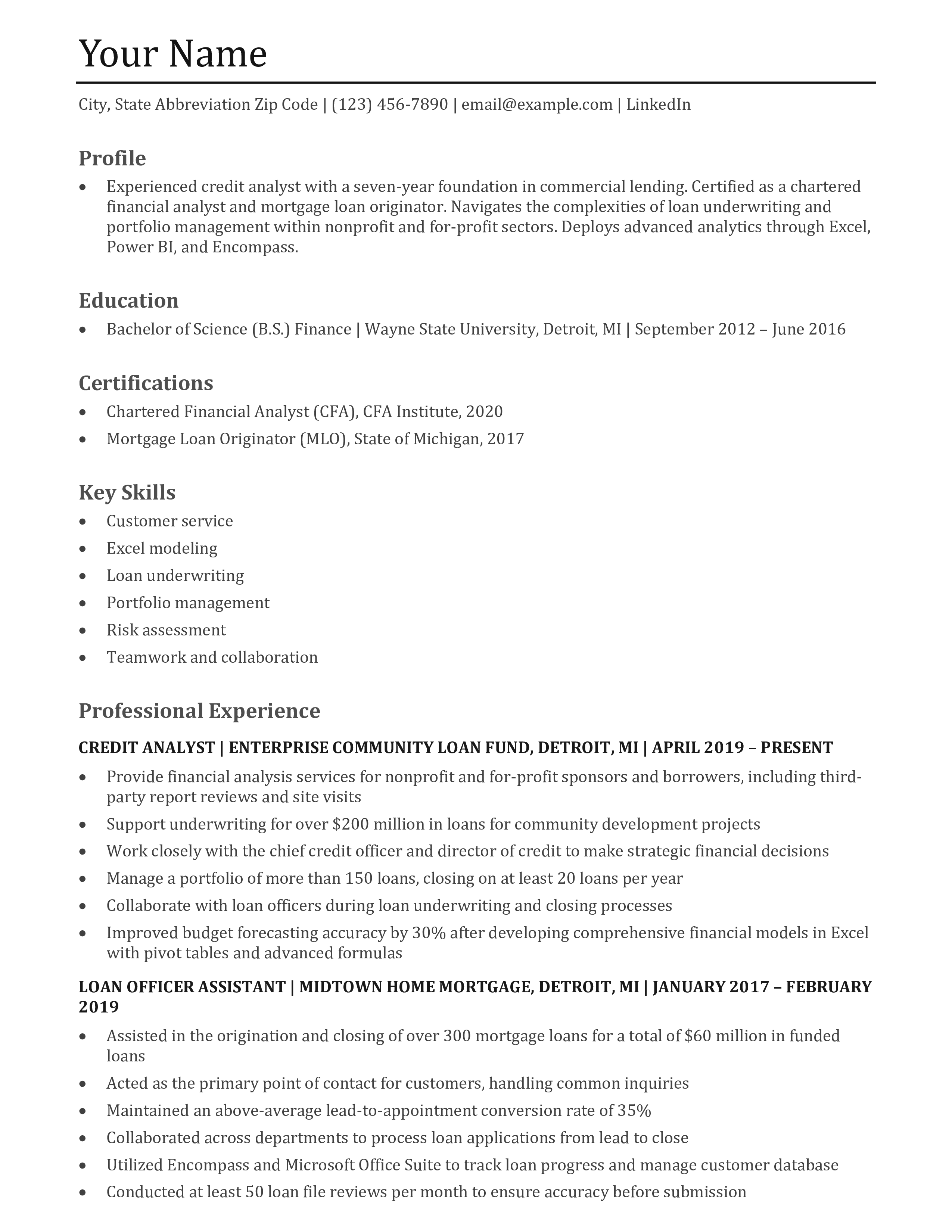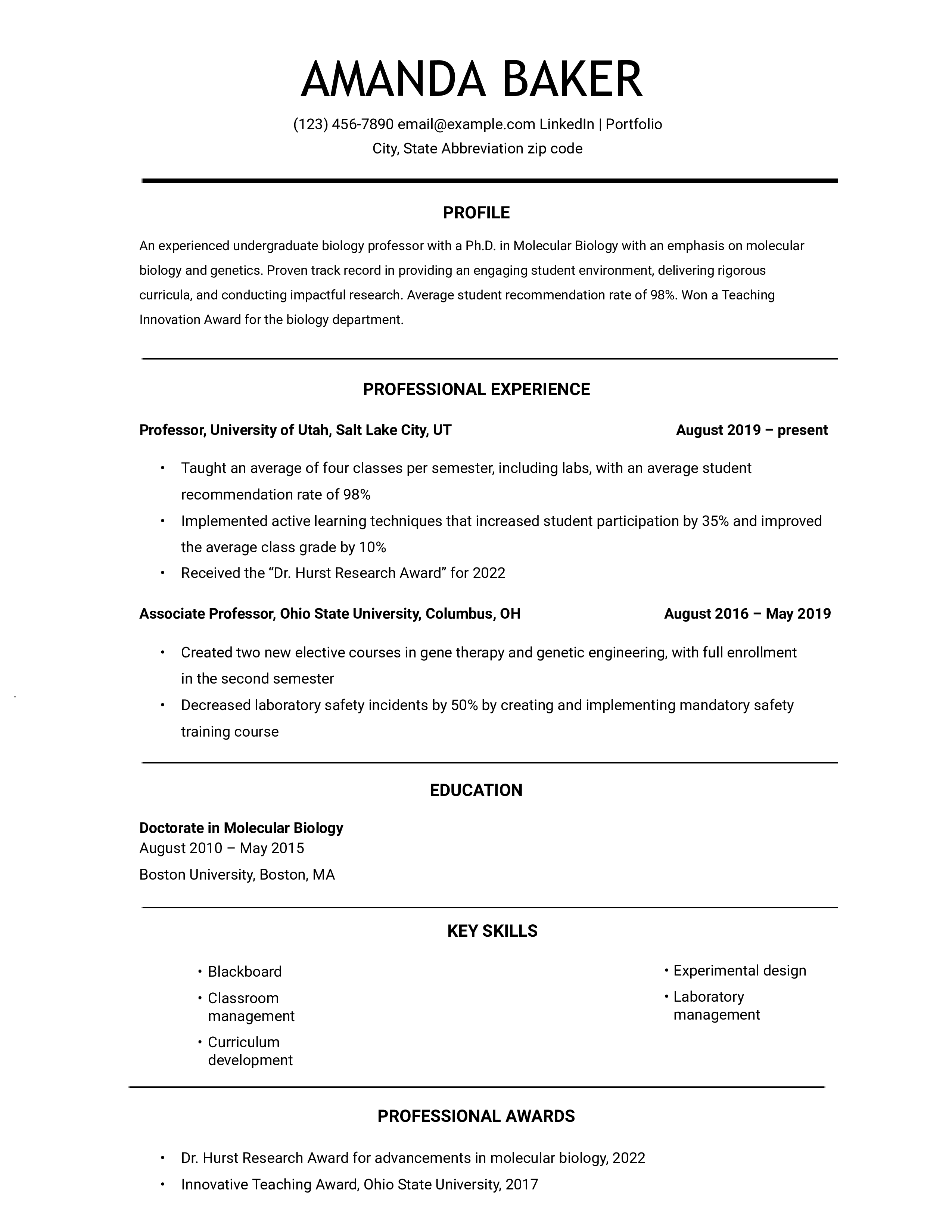Financial Analyst Resume Examples and Templates (Downloadable)
- Entry-Level Financial Analyst
- Mid-Level Financial Analyst
- Senior Level Financial Analyst
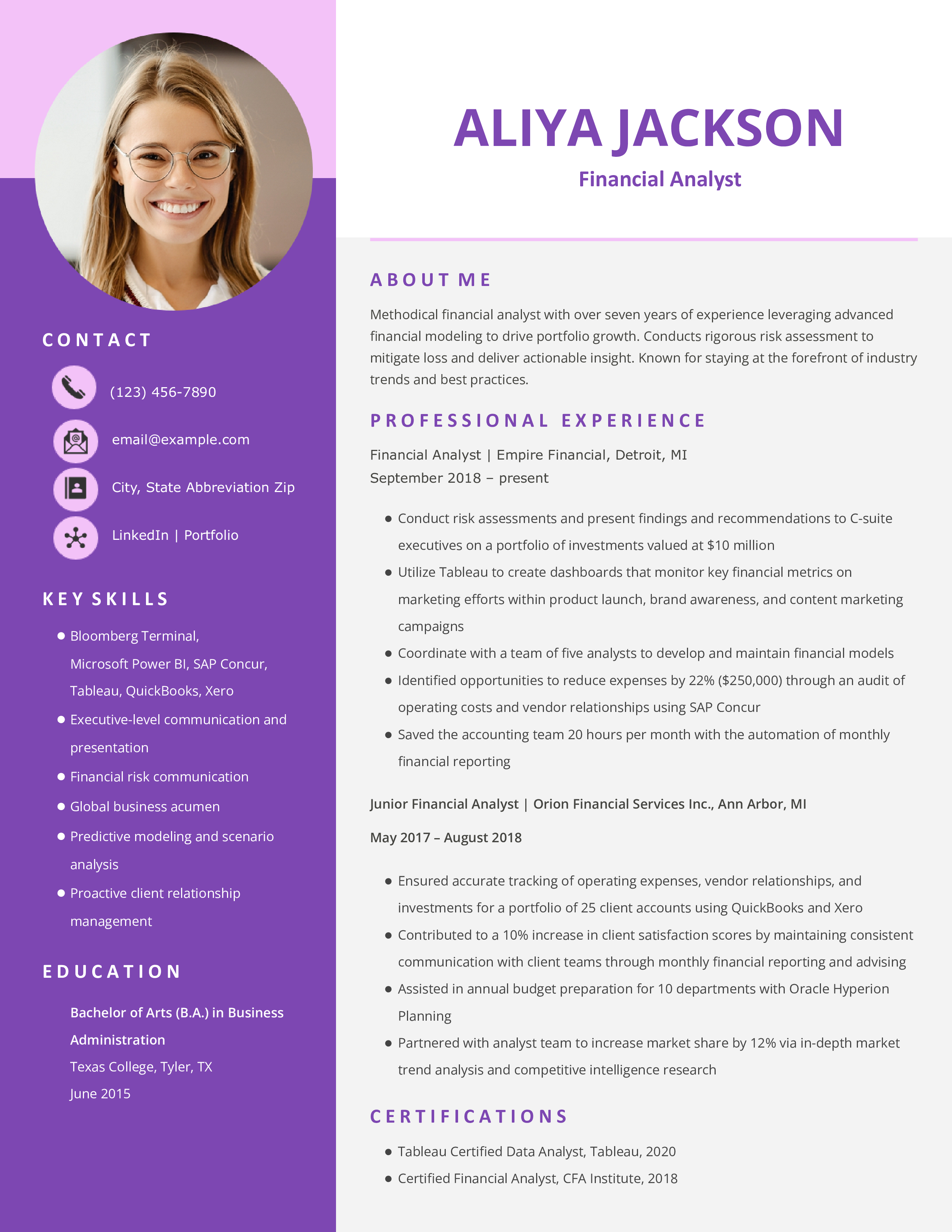
Your financial analyst resume should display how you’ve helped organizations and businesses make informed financial decisions. Hiring managers need to be confident in your ability to drive financial success and mitigate risks for their operations. We’ll provide examples and expert tips to help you create a compelling resume that demonstrates your unique skills and experiences in finance.
Key takeaways:
- Emphasize analytical strengths: Whether in retail, health care, tech, or any other sector, immediately highlight your area of expertise in the profile section. Hiring managers need to know you have the industry knowledge needed to excel in that new position.
- Quantify your results: Numbers are your forte, so put those skills to use by quantifying your own past accomplishments. Percentage improvements, cost savings, and revenue growth should be described using numbers to convey your measurable value.
- Incorporate industry-specific keywords: Applicant Tracking Systems (ATS) look for keywords and phrases as they scan resumes. Using the job description as a guide, include relevant language and finance skills that match your own within your document.
How To Write a Financial Analyst Resume Example
When getting ready to create your financial analyst resume, ensure your resume template includes all the key elements. This helps potential employers get a good understanding of your qualifications and the value you’d bring to the organization. These sections include:
- Contact information
- Profile
- Key skills
- Professional experience
- Education and certifications
1. Share your contact information
Hiring managers need to know how to reach you, so start the resume with your full name, email address (a professional one), and phone number. You can also include your city/state of residence and a link to your LinkedIn profile.
Example
Your Name
(123) 456-7890
[email protected]
City, State Abbreviation Zip Code
LinkedIn
2. Write a brief summary of your financial analyst qualifications
To grab the reader’s attention, you’ll need a succinct, well-written profile section. Think of it as a quick summary of your entire resume, highlighting why you’re the go-to analyst for turning complex financial data into actionable insights.
Mention your years of experience, areas of financial expertise, and any notable achievements or specializations. If you are concerned about age discrimination, rather than showing your years of experience, simply say “experienced.”
For example, maybe you have a track record of identifying risks and opportunities that have led to successful deals — mention that here. Or, if you’ve developed a proprietary valuation model or consistently outperformed market benchmarks in your investment recommendations, include that key information in your profile. The goal is to impress the hiring manager and convey your unique value proposition.
Senior-Level Profile Example
Strategic financial analyst with nearly 10 years in the pet retail and health care space. Leader who drives cross-functional teams to optimize supply chain efficiency. Drives e-commerce growth through predictive modeling of consumer behavior and data-driven product line expansion.
Entry-Level Profile Example
Results-driven financial analyst with a two-year background in investment accounting and bond portfolio management. Recognized for developing innovation risk assessment models and Excel macros to improve valuation accuracy and identify millions in potential savings.
3. Outline your financial analyst experience in a compelling list
The bulk of your resume will consist of your work history. List past jobs starting with your title, employer name and location, and employment dates. Then, provide a few bullets to overview your key accomplishments at those jobs. Consider the industry expectations and specific experiences hiring managers will be looking for.
Analysts are expected to work cross-functionally and influence key decision-making at all levels. Beyond crunching numbers, include examples of how you communicate complex financial concepts to non-financial stakeholders. Clear communication through financial reporting and cross-functional collaboration are just as important.
Senior-Level Professional Experience Example
Senior Financial Analyst, Chewy, Minneapolis, MN
April 2019 – present
- Oversee financial planning and analysis for Chewy’s $500 million Health Care division
- Lead a cross-functional team to implement cost-saving initiatives, resulting in $5 million in annual savings across supply chain, marketing, and customer service operations
- Developed a comprehensive financial model for the successful launch of three new product lines in telemedicine and prescription services
- Exceeded revenue projections by at least 25% in the first quarter of each product launch, leveraging advanced Excel and R for predictive modeling
- Redesigned the annual budgeting processing and reduced cycle time by seven to 10 days
Entry-Level Professional Experience Example
Financial Analyst Intern, Florida Capital Bank, Jacksonville, FL
May 2022 – August 2022
- Analyzed revenue and cost performance for five division units using Tableau
- Supported annual budgeting process for a $50 million department and contributed to a 5% reduction in overhead costs
- Conducted variance analysis on 25 budget line items through Microsoft PowerBI, identifying $75,000 in unexpected expenses
- Delivered monthly performance reports created in Excel for management review within 48 hours of month-end close
Resume writer’s tip: Quantify your experience
Anytime you can add quantitative data to your resume, you’re demonstrating an ability to tell a story with numbers. Don’t simply describe the duties you performed but bring value to the impact your contributions had on the organization. Think about how you can incorporate percentages and numerical details into the line items of your professional experience section.
Do
- “Identified opportunities to reduce expenses by 22% ($250,000) through an audit of operating costs and vendor relationships using SAP Concur”
Don’t
- “Reduced expenses after successful audit”
Resume writer’s tip: Tailor your resume for each application
Show that you’ve done your homework by tailoring your resume for every application submitted. Just like you wouldn’t use the same financial model for every scenario, the same principle applies to your resume. Research the company you’re applying to so you can better understand their market, products or services and the specific job requirements.
Adjust your profile, professional experience section, and skills list to highlight your different qualifications in light of the employer’s needs. Read the job posting carefully to see what they are. For example, if you’re applying to a firm specializing in mergers and acquisitions, emphasize your experience in due diligence, valuation modeling, and deal analysis. Discuss specific transactions you’ve worked on and their outcomes.
What if you don’t have experience?
Landing your first or second financial analyst job requires getting a recruiter or hiring manager to take a chance on you, so make your resume as strong as possible. Even if you don’t have a ton of related work history, you can include other experiences in your background that allowed you to develop the skill sets needed for the job.
For instance, if you were the treasurer for a college club or volunteer organization or completed an internship in the field, those are worth including. You can also add other types of work you did, focusing on the value you brought to your employers.
4.Add financial analyst education and certifications
Employers want to make sure you’ve acquired the knowledge needed to succeed as a financial analyst. Most employers will require entry-level financial analysts to have at least a bachelor’s degree, so list your highest level of education first.
Additionally, include any relevant certifications that you’ve earned, such as Certified Financial Analyst (CFA) or Financial Risk Manager (FRM). Industry-specific and software proficiency credentials can help you stand out from other candidates too.
Education
Template:
[Degree Name]
[School Name], [City, State Abbreviation] | [Graduation Year]
Example:
Bachelor of Science (B.S.) Finance
University of Michigan, Ann Arbor, MI | June 2017
Certifications
Template:
[Certification Name], [Awarding Organization], [Completion Year]
Examples:
Certified Financial Analyst (CFA), CFA Institute, 2018
5. Make a list of your finance-related skills and proficiencies
Hiring managers are looking for specific skills in their search for a financial analyst. Listing yours in a simple bulleted list can help them immediately see if you meet the job requirements they need to fill. It can also optimize your resume for ATS that may be scanning for keywords. The lists of hard and soft skills below are common qualifications you may come across during your job search.
| Hard Skills | |
|---|---|
| Advanced Excel functions (pivot tables, macros) | Bloomberg Terminal |
| Data visualization (Power BI, Tableau) | Financial modeling |
| Merger and acquisition (M&A) modeling | Monte Carlo simulation |
| Regression analysis | Risk analysis and management |
| Soft Skills | |
|---|---|
| Adaptability to market changes | Client relationship management |
| Collaborative financial modeling | Ethical financial decision-making |
| Financial report writing | Financial storytelling |
| Investment strategy | Stakeholder communication |
Resume writer’s tip: Use common action verbs
Choosing the right action verbs can make your career accomplishments come alive on the page. They help with readability and create a clear picture of your past experiences and skills. Instead of passive phrases that merely describe your duties, action verbs convey a proactive approach. Some common verbs that can enhance your financial analyst resume include:
| Action Verbs | |
|---|---|
| Analyzed | Assessed |
| Audited | Benchmarked |
| Compiled | Developed |
| Forecasted | Interpreted |
| Modeled | Optimized |
| Projected | Quantified |
| Reconciled | Researched |
How To Pick the Best Financial Analyst Resume Template
The most reliable resume template for financial analysts is clean and organized rather than flashy or loaded with creative elements. Look for professional templates with clear sections and plenty of room to quantify your achievements. The right template will help hiring managers quickly grasp your value proposition without sifting through clutter.
Financial Analyst Text-Only Resume Examples and Templates
Amar Singh
(123) 456-7890
[email protected]
Miami, FL 12345
LinkedIn | Portfolio
Profile
Results-driven financial analyst with a two-year background in investment accounting and bond portfolio management. Recognized for developing innovation risk assessment models and Excel macros to improve valuation accuracy and identify millions in potential savings.
Key Skills
- Cross-divisional financial analysis
- Data visualization for financial reporting
- Excel macro development
- Investment accounting
- Oracle Hyperion, Microsoft 365, Morningstar Direct, Tableau, QuickBooks
- Quantitative insight translation
Professional Experience
Junior Financial Analyst, BanksUnited, Miami, FL
September 2022 – present
- Manage daily investment accounting operations for a $500 million bond portfolio
- Prepare and review over 15 monthly and quarterly journal entries in Oracle Hyperion, reducing processing time from eight to six hours within the first year of employment
- Identify and resolve discrepancies within 24 hours to reconcile investment counts to the general ledger with 99% accuracy
- Contributed to the creation of a risk assessment model in MATLAB that identified $2 million in potential savings from portfolio reallocation
- Developed a new Excel macro for bond valuation, increasing accuracy by 15%
Financial Analyst Intern, Florida Capital Bank, Jacksonville, FL
May 2022 – August 2022
- Analyzed revenue and cost performance for five division units using Tableau
- Supported annual budgeting process for a $50 million department and contributed to a 5% reduction in overhead costs
- Conducted variance analysis on 25 budget line items through Microsoft PowerBI, identifying $75,000 in unexpected expenses
- Delivered monthly performance reports created in Excel for management review within 48 hours of month-end close
Education
Bachelor of Science (B.S.) Finance, May 2022
University of Florida, Gainesville, FL
Certifications
- Chartered Financial Analyst (CFA) Level I, CFA Institute, 2024
- Microsoft Office Specialist: Excel Associate, Microsoft, 2022
Frequently Asked Questions: Financial Analyst Resume Examples and Advice
How do you align your resume with a financial analyst job description?
New investment opportunities and business expansion continue to drive the need for financial analysts. Between 2022 and 2032, job growth in the field will increase faster than average, creating a healthy demand. To stand out from other analysts racing to fill these new roles, you’ll need to align your resume with the job description.
Read the job posting. Look for keywords, skills, and phrases that match your own qualifications and include similar language in your resume. This shouldn’t be a copy-and-paste situation but a careful incorporation to demonstrate that you’re the right financial analyst for the job.
What is the best financial analyst resume format?
Focusing on your professional experience is the best move for a financial analyst resume, making the chronological format a great choice. From entry-level to more senior positions, hiring managers will get the full picture of your finance career. This is the standard within the industry, and most hiring managers expect to see this style of resume. It highlights your stability, progression, and most recent achievements for a comprehensive overview of your qualifications.
Include a cover letter with your resume
A well-written cover letter provides context to the data points of your resume. Use this space to demonstrate your financial acumen, passion for numbers, and enthusiasm for the opportunity. Give hiring managers a glimpse into why you would be the best financial analyst for the job. This is a strategic move that increases your likelihood of standing out and landing an interview.
Check Out Related Examples
Resume Templates offers free, HR approved resume templates to help you create a professional resume in minutes. Choose from several template options and even pre-populate a resume from your profile.

